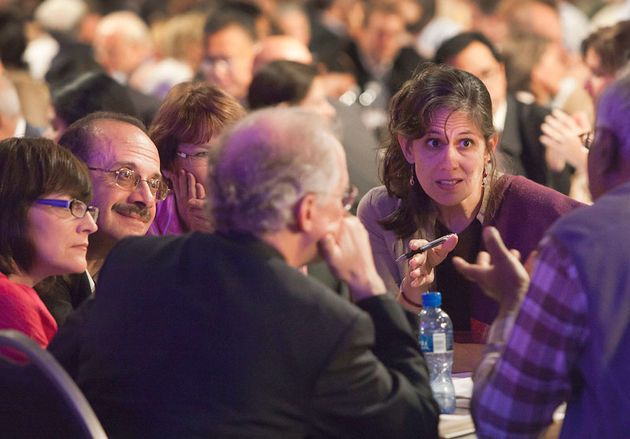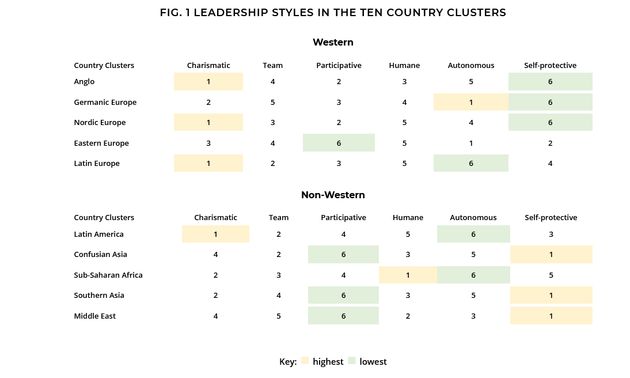A critique of Western Christian leadeship in light of global trends. An article by Mary Ho.
![Image via [link]Lausanne Movement[/link].](https://cms.evangelicalfocus.com/upload/imagenes/614adb75daee4_lgadrinking.jpg) Image via [link]Lausanne Movement[/link].
Image via [link]Lausanne Movement[/link].
‘It’s good if you invite me to the table but it’s far better if you invite me to the kitchen’, an African leader leaned over and whispered to Todd Johnson at a mission leaders conference where only a handful of African leaders were represented.1
Tables are where the menu and place settings are already prepared. But the kitchen is where the ingredients and dishes are made from scratch. The kitchen is chaotic and messy, as teams of chefs concoct fusion dishes with unfamiliar sauces and clashing spices mixed together for the first time.
In the kitchen, Western Christian leaders are one of the many ‘chefs’. They do not set the table for everyone else. Instead, we must innovate international cuisine together.
The crux is in how we come together. Jeff Adams, who pastored a large American church and was also a missionary during the war in El Salvador, recalls forming a multi-ethnic board for a large mission organization, when an Asian leader protested, ‘How can we lead as a board when we don’t even drink tea together and know the names of each other’s children?’2
As Western Christian leaders ‘drink tea’ with their counterparts, one non-Western leader commented, ‘I was welcomed, but now I am wanted.’
It is not that Western leadership is subsiding. It is that non-Western leadership is rising. Western Christian leadership is occurring in the context of a tectonic shift of global Christianity from the Global North to the Global South. 3
While 82% of Christians lived in the Global North in 1900, only 33% of Christians are in Europe and North America today. As of 2020, 67%—much of the world’s population—live in Asia, Africa, Latin America, and Oceania, with the Christian population projected to be 77% in the Global South by 2050. 4
The global shift is dramatic. Christianity is growing the fastest in Africa (667 million Christians) and Latin America (612 million). Out of every 100 Christians, 26 live in Africa, 24 in Latin America, 23 in Europe, 15 in Asia, 11 in North America, and 1 in Oceania. 5 6
This means that Western Christian leaders are to encourage the rise of non-Western missiology and theology.
For example, the Korean Minjung theology identifies with the suffering of the minjung or the oppressed ‘masses’. In recent years, initiatives such as John Stott’s Langham Partnership 7 have publicized the biblical perspective of indigenous theological leaders in the Global South.
We are living in a global era where what the global church needs are global leaders with a global mindset, not just Western leadership styles and writings exported to the rest of the world. 8
Additionally, what is alarming is that this explosive growth of the Christian church in the Global South is occurring where the Human Development Index (HDI)9 is the lowest—where poverty, illiteracy, civil conflict, and diseases abound. Most of Christian growth and missions will come from underdeveloped and troubled regions.

The urbanization trend is equally harrowing. Most of the future megacities will be in underdeveloped countries, triggering complex socio-economic issues, such as an increase in women-at-risk, children-at-risk, migrant workers, and slum dwellers.
The UN estimates that 35% of urbanization will occur in China, India, and Nigeria between 2018 and 2050. 10 Therefore, it is vital that Western Christian leaders engage in ‘radical collaboration’11 with their non-Western counterparts to address the complex socio-economic realities, injustices, and inequalities confronting the global church.
We need Christian leaders with a ‘kingdom paradigm’ for holistic community transformation 12 wherever the gospel is being preached. ‘We cannot dichotomize the gospel between the spiritual and the physical. We have to bring the whole gospel to the whole person’, insists Bekele Shanko, Founder and Chairman of the Global Alliance for Church Multiplication (GACX), who has served for 27 years in his home country Ethiopia, as well as Uganda, Zimbabwe, South Africa, and the US. 13
Moreover, about 85%nt of the world’s least reached peoples—Frontier People Groups (FPG) with less than 0.1 percent Christians—are either Muslim or Hindu 12 and are concentrated in moderate to high persecution countries.
Indeed, we live in a time of unprecedented persecution of Christians and martyrdom. More Christians have been persecuted in the past few years than any other era in history 15 and martyrdom is projected to increase to 1 million by 2015-25. 16
Christian leaders are challenged to lead the global church in finishing the task of taking the gospel to every remaining people group. This will require risk, suffering, and sacrifice, even at the cost of lives.
Shanko has witnessed firsthand how suffering and persecution refine the faith through dedication, surrender, and fervent desperate prayer. 17

Thus Western Christian leaders can be effective global leaders when they:
Shanko believes that the humility of servant leadership 18 is the key to Western Christian leadership. Humility is saying ‘I want to learn. How can I learn from your experience? 19
When we come together, he advises that Western Christian leaders come ready to listen and learn before contributing.
Similarly, as Jeff Adams was leaving for El Salvador, the best advice he received was from his mentor, ‘Do nothing. . . . But determine first what God is doing and where he is, and let the Holy Spirit lead the way.’
According to Adams, we should establish relationship before we market Jesus; adopt the ‘theology of the ordinary’—like drinking tea together—and represent Jesus in all walks of life.
The true power of leadership is living Jesus’ ordinary life. It is not our responsibility to change the world but to change the way we live in order to impact the world for Christ.
Angel Cabrera and Gregory Unruh insist that ‘global leaders craft solutions by bringing together people and resources across national, cultural, even organizational boundaries.
Global leaders are visionaries inspired by a worldwide challenge that remains unsolved, an ignored social injustice or a business opportunity that has gone unexploited.’[20]
Global leaders are ‘boundary spanners’ who have acquired the three main global leadership competencies of having: 1) a global mindset to connect with others across organizational, cultural, and national boundaries; 2) global entrepreneurship to create value and innovate solutions; and, 3) global citizenship that produces positive contribution and benefit across the boundaries.21

What is Western leadership? Even among the North American and European countries, Western leadership styles vary according to cultural variances.
In 2004, the landmark GLOBE project surveyed 17,000 managers from 951 organizations in 62 countries. 22 They identified six key desired leadership styles, based on 112 leadership attributes and 21 primary leadership dimensions: 23
The results are as follows:

The Globe research concluded that ‘the key and perhaps the crux for successful executive leadership in a global world is that executives . . . lead . . . with the leadership prototypes that are consistent with their particular culture.’ 24
In other words, ‘Roman leaders lead in a manner expected in Rome.’ 25 Therefore, Western Christian leaders cannot export Western leadership into the rest of the world without self-awareness and filter.
The chart offers Western leaders clues on how to adjust their leadership styles to be effective in different cultures. For example, most Western countries prefer a charismatic/value-based (C/VB) leadership, especially in the Anglo, 26 Nordic European,27] and Latin European 28 countries.
The Anglo, Germanic, 29 and Nordic European countries are also low in self-protective leadership style which dominates Asian and Middle Eastern leadership.
So Western Christian leaders from these regions would do well to be cognizant of honoring the face-saving norms, status, and authority of their Asian and Middle Eastern partners.
There is good news for Western leaders. The GLOBE research indicated that the highest scoring leadership style was the C/VB leadership.
People universally appreciate ‘successful leaders (who) enact core universally desired behaviors that comprise charismatic value-based leadership . . . it means developing a vision, inspiring others, demonstrating integrity, being decisive, and creating a performance-oriented culture.’ 30
Additionally, team commitment and team solidarity were also highly valued across the leadership styles. So, a Western Christian leader would generally succeed by adopting a C/VB and team-oriented style across multiple cultures.
Both leadership styles are highly relational. Therefore, Western leaders would do well to ‘drink tea’ often and prioritize relationship over rules, operations, and efficiency.
Moving from being Western Christian leaders to being global Christian leaders is hard. It is costly. Adapting to other cultures is not just enlarging or renovating a pre-existing modern kitchen. It is to tear down and rebuild the entire kitchen from the foundation up and reconfigurate the walls.
Many non-Western kitchens are open air, feature an indoor fire pit, or have a built-in braai grill 31 in the walls. So, we must not only invite global leaders to the old kitchen that we cherished; instead, we must rebuild a new ‘cross-fit’ kitchen. And we must do it together. And afterwards, we can dine and drink tea together.
Dr Mary Ho is the International Executive Leader of All Nations, a global Christian missions organization with workers making disciples and church planting in 45 countries.
She is passionate about finishing the Great Commission in this generation by sharing the love of God among every people and in parts of the world where the name of Jesus Christ is little or not known. She received her Doctor of Strategic Leadership from Regent University, VA, U.S.A.
This article originally appeared in the September 2021 issue of the Lausanne Global Analysis and is published here with permission. To receive this free bimonthly publication from the Lausanne Movement, subscribe online at www.lausanne.org/analysis.
1. Todd Johnson, https://www.gordonconwell.edu/blog/all-peoples-in-gods-kitchen/.
2. Interview with Jeff Adams, Founder/President, Missional Impact, May 2021.
3. Global North is a geopolitical designation, including 54 countries in the five regions of Northern America, Western Europe, Eastern Europe (including Russia), Northern Europe, and Southern Europe. Global South includes the 180 countries in the remaining seventeen UN regions: Central Asia, Eastern Asia, South Asia, Southeastern Asia, Western Asia, Eastern Africa, Middle Africa, Northern Africa, Southern Africa, Western Africa, Caribbean, Central America, South America, Australia/New Zealand, Melanesia, Micronesia and Polynesia.
4. Todd Johnson and Gina Zurlo, eds., World Christian Encyclopedia, 3rd edition (Edinburgh: Edinburgh University Press, 2020), 3-4.
5. Johnson and Zurlo, World Christian Encyclopedia, 3-4.
6. Johnson and Zurlo, World Christian Encyclopedia, 32.
7. https://us.langham.org.
8. Editor’s Note: See article by Mary Ho, entitled, ‘Global Leadership for Global Mission: How mission leaders can become world-class global leaders’, in November 2016 issue of Lausanne Global Analysis, https://lausanne.org/content/lga/2016-11/global-leadership-for-global-mission.
9. The United Nations’ Human Development Index (HDI) measures GDP, literacy, education, and life expectancy. 10. Shelbi Austin, ‘The Ten Largest Cities in the World’, US News, 18 December 2019, https://www.usnews.com/news/cities/slideshows/the-10-largest-cities-in-the-world.
11. Coined by T.V. Thomas, Global Mobilization Consultation, Brazil, December 2019.
12. Christian community transformation involves a ‘change in the whole of the person—material, social and spiritual—as well as in the community—economics, social, and political.’ Samuel J. Voorhies, ‘Transformational Development: God at Work Change People and Their Communities’, Perspectives of World Christian Movement (Pasadena: William Carey Library, 2009), 603.
13. Interview with Bekele Shanko, Founder and Chairman of GACX and Vice President for CRU Global Church Movement, June 2021.
14. Rebecca Lewis, ‘Clarifying the Remaining Frontier Mission Task’, International Journal of Frontier Missiology, 35:4 Winter 2018: 155-68, https://www.ijfm.org/PDFs_IJFM/35_4_PDFs/IJFM_35_4-Lewis.pdf.
15. ‘World Watch List 2020: Trends’, Open Doors, https://www.opendoorsuk.org/persecution/wwl20-trends/.
16.Todd M. Johnson, Gina A. Zurlo, Albert W. Hickman, and Peter F. Crossing, ‘Christianity 2018: More African Christians and Counting Martyrs’, International Bulletin of Mission Research 42, no. 1 (2018): 25.
17.Bekele Shanko, June 2021.
18. Mary Ho, ‘The Transcendent Culture of Servant Leadership: Principles for 21st Century Global Mission,’ Lausanne Global Analysis, March 2020, https://lausanne.org/content/lga/2020-03/transcendent-culture-servant-leadership.
19. Bekele Shanko, June 2021.
20. Angel Cabrera and Gregory Unruh, Being Global: How to Think, Act, and Lead in a Transformed World (Boston: Harvard Business Review Press, 2012), 12.
21. Cabrera and Unruh, Being Global, 24-27.
22. Peter Dorfman, Mansour Javidan, Paul Hanges, Ali Dastmalchian, Robert House, ‘GLOBE: A Twenty Year Journey into the Intriguing World of Culture and Leadership’, Journal of World Business, 47 (2012): 505-7.
23. Dorfman, et al, ‘GLOBE’, 505.
24. Dorfman, et al, ‘GLOBE’, 514.
25. Dorfman, et al, ‘GLOBE’, 514.
26. Canada, U.S., Australia, Ireland, England, South Africa (white sample), and New Zealand.
27. Denmark, Finland, and Sweden.
28. Israel, Italy, Switzerland (Francophone), Spain, Portugal, and France.
29. Austria, The Netherlands, Switzerland, and Germany.
30. Dorfman, et al, ‘GLOBE’, 514.
31. A South African barbeque.

Las opiniones vertidas por nuestros colaboradores se realizan a nivel personal, pudiendo coincidir o no con la postura de la dirección de Protestante Digital.